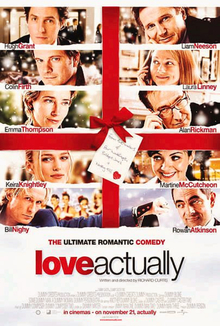 Ten years after the initial release of Love Actually, it has become fashionable to bash the movie. Some of its crimes, as ticked off unrelentingly by the Internet cognoscenti: It is “unrealistic.” Women are reduced to trophies. Men are encouraged to execute “grand gestures” to win a woman against all odds. And so on. 1
Ten years after the initial release of Love Actually, it has become fashionable to bash the movie. Some of its crimes, as ticked off unrelentingly by the Internet cognoscenti: It is “unrealistic.” Women are reduced to trophies. Men are encouraged to execute “grand gestures” to win a woman against all odds. And so on. 1
I am an unashamed, unapologetic fan of the movie, but I actually agree with many of these criticisms. “Agree” in the sense that they accurately reflect the content of the movie, but — as Inigo said to Vizzini — “I do not think it means what you think it means.”
In short, writer/director Richard Curtis is deliberately committing the crimes of which he is accused…all in service of debunking Hollywood’s notions of romantic love. The obviously tongue-in-cheek tale of Sir Colin’s trip to the Americas and his rather unlikely lucky streak there (Shannon Elizabeth! Denise Richards! January Jones!) is a big clue to this — it’s a broad joke crammed into the midst of what appears to be an otherwise earnest set of tales, and proves that Curtis knows exactly what he’s doing. In short, if you accept that Curtis is knowingly taking the piss here, then you must admit that maybe he’s doing so elsewhere in the movie, too.
Sure, Colin Firth’s “grand gesture” works — he gets the girl. But Andrew Lincoln’s doesn’t even have a shot at working. He gets a pity kiss and even he walks away saying, “Enough.” He’s walked up to the borderline of the romance trope and shaken his head in disgust. Curtis is commenting on his own movie’s proclivities within the movie itself, telling the audience, “Hey, don’t think this shit actually works, okay?”
Why? Well, it’s pretty clear what Curtis’s point is once you get to the very end of the movie.
The film ends with a video mosaic of actual people (read: not actors) embracing at Heathrow. The movie uses the absurd, overblown tropes of popular romantic stories and romantic comedies in service of a final point, represented in this mosaic. It’s not an accident that Richard Curtis ends the movie thus. Here’s what he — and Love Actually — is saying:
“So, you just spent two hours watching every cliché in the romance playbook, as well as some other stuff. And it made you feel a certain way, as it does every time you see it, in whatever movie. These are clichés because they work. But what I’m here to tell you is this: That pleasant, buzzy, love-y feeling you get from the fakery of the movies? It’s all around you. Right now. Look at these people I’m closing the movie with. They’re not actors, celebrities, or movie stars. They’re in love and they are loved and they’re real and they’re happy. Without ridiculous plot lines or rejiggered emotions or implausible coincidences. It’s right here, right now, and you have it, just like these people do. You don’t need a movie to feel this way — you just need the people you love and who love you. So stop looking for it in movies and go live it.”
The whole point of the movie is to obviate its own ancestors and its own lineage.
It’s so blindingly obvious that I’m still shocked when people don’t get it. Why end the movie with the mosaic otherwise? Especially since it bookends the similar scene at the very beginning of the film, in which Hugh Grant’s voiceover basically tells you what I’ve just said in advance, including saying, “Love actually is all around.”
Check out the movie poster: “The Ultimate Romantic Comedy.” The word ultimate refers to the end of a process. Curtis is telling you from the start: This is the last romantic comedy you’ll need to see.
As Daisy would say: “Duh.”
And that’s why I am happy to defend Love Actually.
Plus, there’s a Christmas lobster. How can you not love a fucking Christmas lobster?
- Even the best criticisms seem to cherry-pick moments and story threads, conveniently ignoring — for example — the quite lovely platonic love story between Bill Nighy and his manager. Or the very tortured, fractured Alan Rickman/Emma Thompson story, which even the most hard-hearted must agree is devastatingly well-acted, especially on Ms. Thompson’s part.
